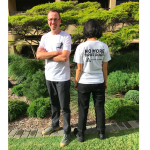For the Rights of the Marginalised: An Interview With Greens Candidate Kym Chapple

Whilst she’s been doorknocking in the lead up to the NSW state election that’s set to take place in a fortnight, NSW Greens candidate for Heffron Kym Chapple has found that concerns around drug law reform have been front and centre for many in her electorate.
If it was Gladys Berejiklian standing at these constituents’ front doors, she would’ve raised her eyebrows and said, “Just say no.” But, of course, living in the era after the drug war has been declared an abject failure, this out-of-date advice from a soon to be former premier no longer cuts it.
Indeed, there are a lot of people scratching their heads as to why Berejiklian never considered the evidence that pill testing works following the deaths of young Australians at festivals this season. Rather she denied the proof exists and has instead set her sights on trying to shut down events.
But, for those Heffron residents who raised concerns around drug laws at their doorsteps, they found that Ms Chapple is forward-thinking: a potential MP who could represent their views in parliament and advocate for drug use to be treated like a health issue, and no longer a crime.
Sound drug policies
The NSW Greens policy approach to drugs is based around harm minimisation and drug regulation. On the matter of pill testing, they are the most vocal political proponents of this method of saving people’s lives by testing the contents of their drugs. It has been utilised in Europe since the 90s.
The party has recently announced that it wants to see MDMA legalised and sold over the counter in a move that would end the harms associated with some of the dodgy drugs being circulated on the black market, which have led to the deaths of five young people at festivals since September.
And cannabis is another drug the NSW Greens are suggesting be legalised and regulated. A private members bill planned to be introduced post-election would see the plant sold retail, an allowance to cultivate six homegrown plants and the ability to smoke it where tobacco is smoked today.
Benefiting the disadvantaged
With 15 years of campaigning for human rights and social justice behind her, Ms Chapple is also calling for change around the steadily increasing numbers of women that are finding themselves behind bars in NSW correctional centres.
In her recent article on the criminalisation of women, Chapple puts forth that the issue of the rising numbers of disadvantaged women finding themselves caught in the criminal justice system could be curbed by providing the courts with expanded sentencing options so that prison is a last resort.
And Ms Chapple also has her eyes on decriminalising abortion, as NSW is now the only state not to have brought its archaic laws around this procedure into the twenty first century. And again, those disproportionately impacted by these laws are the most disadvantaged and vulnerable.
Sydney Criminal Lawyers spoke with Kym Chapple about the detrimental effects the rising use of sniffer dogs is having, why First Nations women are the fastest growing group being incarcerated in this state, and the reasons why decriminalising abortion is way overdue.
Firstly, you mentioned an issue that many locals raised whilst you’ve been campaigning has been drug laws. Kym, what aspects of the current debate around drug law reform have mainly been mentioned?
The most common thing people have asked me – often a bunch of people said it in a row – is what’s your position on pill testing.
It’s clear that the deaths of a number of young people over the summer at festivals, and pill testing being touted as a way of keeping people safe, has really struck the public imagination.
And people do see there’s a clear need to respond to the dangers of what can be in pills that are being sold as MDMA, but contain other substances.
The other thing people want to talk about a fair bit is drug dogs and their use not just at festivals, but also at the train stations that we often visit. We campaign in the mornings, so we don’t often see the drug dogs there at that time.
But, we do know that a lot of people on their way home are encountering drug dogs and are often subject to searches, despite the fact that they’ve got nothing on them. That’s a real invasive process that can really ruin your day, for no good reason.
The broader issue there is obviously this need to end the war on drugs. And concerns about how policing drugs is affecting communities, particularly young people and Aboriginal people.
The NSW Greens plan to introduce a private member’s bill within 100 days after the election, which would legalise recreational cannabis. Why is the time right to remove prohibitions around cannabis?
It’s actually been the right time for a while. And it has been Greens policy for a long time. But, it’s right now because the rest of the politicians are starting to catch up. And we have an actual chance of getting this done.
If you’ve been paying any attention to the media over the past few months, you can definitely see that there’s a consensus amongst the medical community, health experts, people around festivals and young people that legalising cannabis is going to remove so many harms in the current system.
We know the cost of the war on cannabis is $78.1 million dollars just for policing and courts.
That’s not accounting for the impact on the health system, or the impact on people’s lives, when they’re caught with a joint or two and thrown into gaol, which disrupts everything around their lives, their careers and their education.
The harm caused by cannabis is mainly caused by the war on cannabis.
Five young Australians have died at music festivals in drug-related circumstances since last September. The NSW Greens are a vocal supporter of the roll out of pill testing at festivals.
But, further your party also advocated for the legalisation of MDMA. Why is pill testing not enough?
Pill testing is necessary in the current policy setting, because the illegal drugs are made in dubious circumstances with questionable substances in them that can literally be deadly.
A more long-term solution is to change the policy setting, so when you intend to buy MDMA, you actually get MDMA.
And it also gives this opportunity at point of sale when you buy MDMA, you can then get advice on how to consume it safely, the opportunity to be connected to peer-to-peer support and drug counselling services if drug use is a problem for you.
Currently, there’s a remarkable situation where there’s more guidance on how to take paracetamol than there is on something like MDMA.
And we know that keeping people cool, making sure they hydrate, all these things, if people know to do them, they will stay safer.
The Berejiklian government’s kneejerk reaction to the initial two deaths at Defqon.1 in September was to come out with further tough on drugs measures.
The latest of which was to threaten the whole festival industry with an overbearing licensing scheme, which, at the last minute, it said only applied to 14 festivals.
Yes. The “high risk” festivals.
What do you think about the Liberal Nationals government response around the matter of safety at festivals?
We should be clear that festivals aren’t killing people. It’s the war on drugs that’s killing people. It’s creating this policy setting in which the drugs that people take are potentially lethal, because they’re not actually MDMA.
People aren’t being killed by pure MDMA. They’re being killed because they’re drinking drain cleaner.
The criteria used to identify the 14 high risk festivals are preposterous. One of the indicators is whether there is electronic dance music at the festival. That’s a cultural war against young people.
I don’t see them taking the sniffer dogs to the opera, but I’m fairly sure there’s a fair bit of drug use going on up there.
You’ve already touched on this a little, but despite long-term criticism of sniffer dog operations at festivals, NSW police have only ramped up their use of the dogs over the present season.
What sort of effect do you think this further intensification of sniffer dog use at events in NSW is having?
The first effect it’s having is that more and more people are being searched and strip searched for no reason. And that’s in itself is a problem. That is a violation of their civil liberties. And the dogs are wrong more often than not.
The other thing that it’s doing through that process is it’s increasing mistrust in police, because young people won’t turn to police if they feel like they’re going to be monstered by the dogs.
We know it’s also delaying people from seeking help at music festivals, because they know the medical tents are often watched over by police. That’s inherently causing danger.
And we know it causes harm. We know people when they see the dogs will sometimes drop all of their drugs at one time, which is basically the least safe way you could take a drug. And it’s causing death.
But, there’s also a positive, which is it’s making people work together to challenge that system.
And Sniff Off, which was started by David Shoebridge’s office, has been particularly powerful in creating a community of people who will look out for each other and stand up against the overly aggressive policing tactics of drug dogs.
You recently wrote an article about the increasing criminalisation of women. Between 2011 and 2017, the number of women being held in NSW correctional facilities grew by 50 percent.
How would you describe the plight of women who are sent to prison in this state? And why should it be of concern?
What I saw when I looked at who is incarcerated in NSW is that the women who are in our prisons don’t look like the general population.
And that’s not because of offending. It’s because of a very specific history of disadvantage and victimisation.
These women suffer from high levels of social and economic disadvantage. And the justice system at every level appears to be looking to entrench this disadvantage, rather than breaking the cycle.
The largest growth in a particular group of inmates in NSW, as well as nationally, is First Nations women. Over 2011 to 2017, the number of Aboriginal women locked up in NSW facilities grew by 74 percent.
Nationally, Indigenous women only make up 2.8 percent of the general female population, but they account for 34 percent of the women being incarcerated in the nation’s prisons.
In your understanding, why is there this sudden spike in First Nations women being incarcerated?
Obviously, the answer to that is there’s a multitude of factors involved. One of the most important is we know over-policing is a factor in Aboriginal incarceration.
We know in areas in NSW with high Aboriginal populations, Aboriginal women are locked up for intoxication at 40 times the rate of non-Aboriginal women.
We also know that with the Suspect Target Management Program, most of the children and young people on that list are Aboriginal.
One of the other reasons that there’s this spike is we know that Aboriginal communities are targeted by the out-of-home care system.
And the children who are removed from their parents and placed in out-of-home care are far more likely to enter the justice system. And then when they themselves have children, those children are more likely to enter the justice system.
What we are seeing there is the logical result of systemic disadvantage being entrenched and being transmitted generationally.
And that’s something we should all be appalled about and do everything we can to change.
You also advocate for the decriminalisation of abortion. What do you think about the circumstances where a woman can still potentially be charged for undergoing this procedure?
The decriminalisation of abortion is both a symbolic issue in the sense of women having control and autonomy over their bodies at law, but it’s also a very real issue.
The current criminalisation means particularly marginalised poorer women take longer to seek an abortion if they need one.
Cover under Medicare is non-existent and that can mean a financial obstacle to people. If you can’t afford to have a child, then $500 to have an abortion might also be out of your reach.
In NSW, there are no commitments from the major parties to decriminalise. But, Labor has said they will have a Law Reform Commission inquiry.
We know that Queensland last year delivered a similar inquiry. They had a 300 page report done over a year that unambiguously recommended decriminalisation. And they made that law there.
NSW is the only state that has failed to modernise its laws. And again, it’s just time.
And lastly, Kym, what will it mean for the constituents in Heffron if they vote you in as their representative in state parliament? What issues will you be prioritising for them?
At a statewide level, we care about things like justice and fairness, which means creating a fair society with homes for all and renters’ rights.
We also care about public services for public good. And in Heffron, public transport in particular is at breaking point and desperately needs significant investment to return stations to public hands.
We also care about the environment, as do the people of Heffron. So, things like street trees all the way through to publicly-owned renewable energy and climate change targets. And that’s what we’ve been campaigning on.







